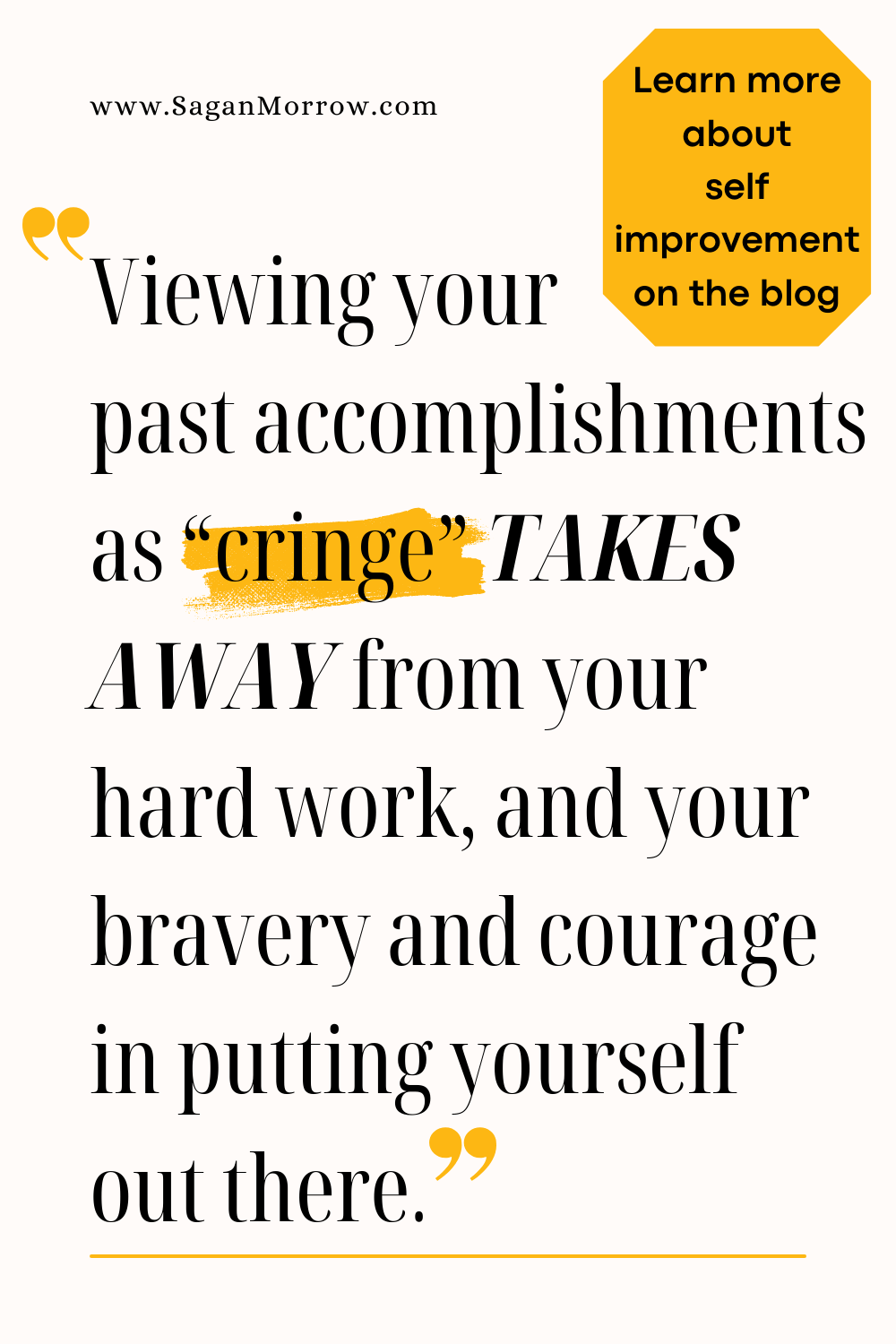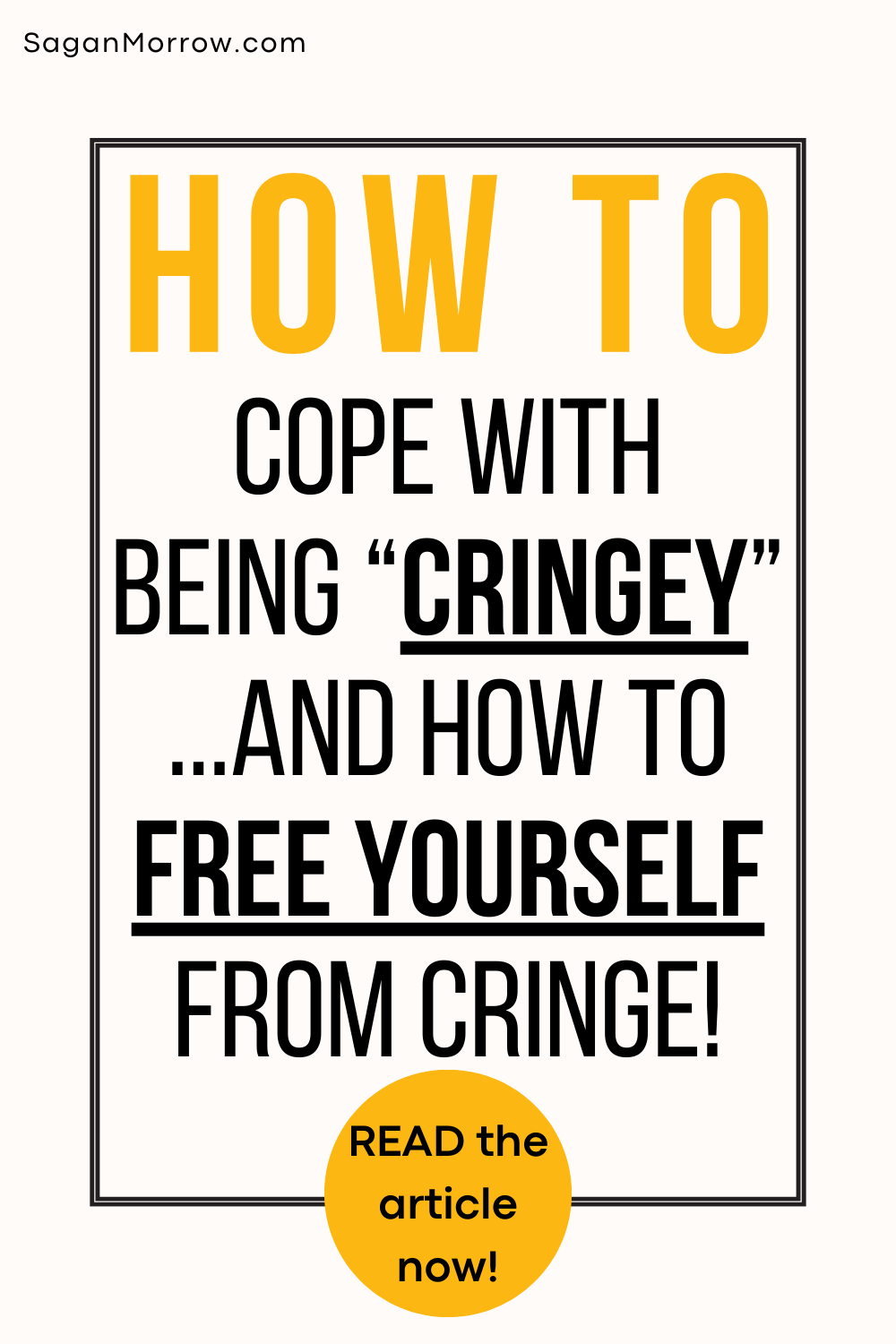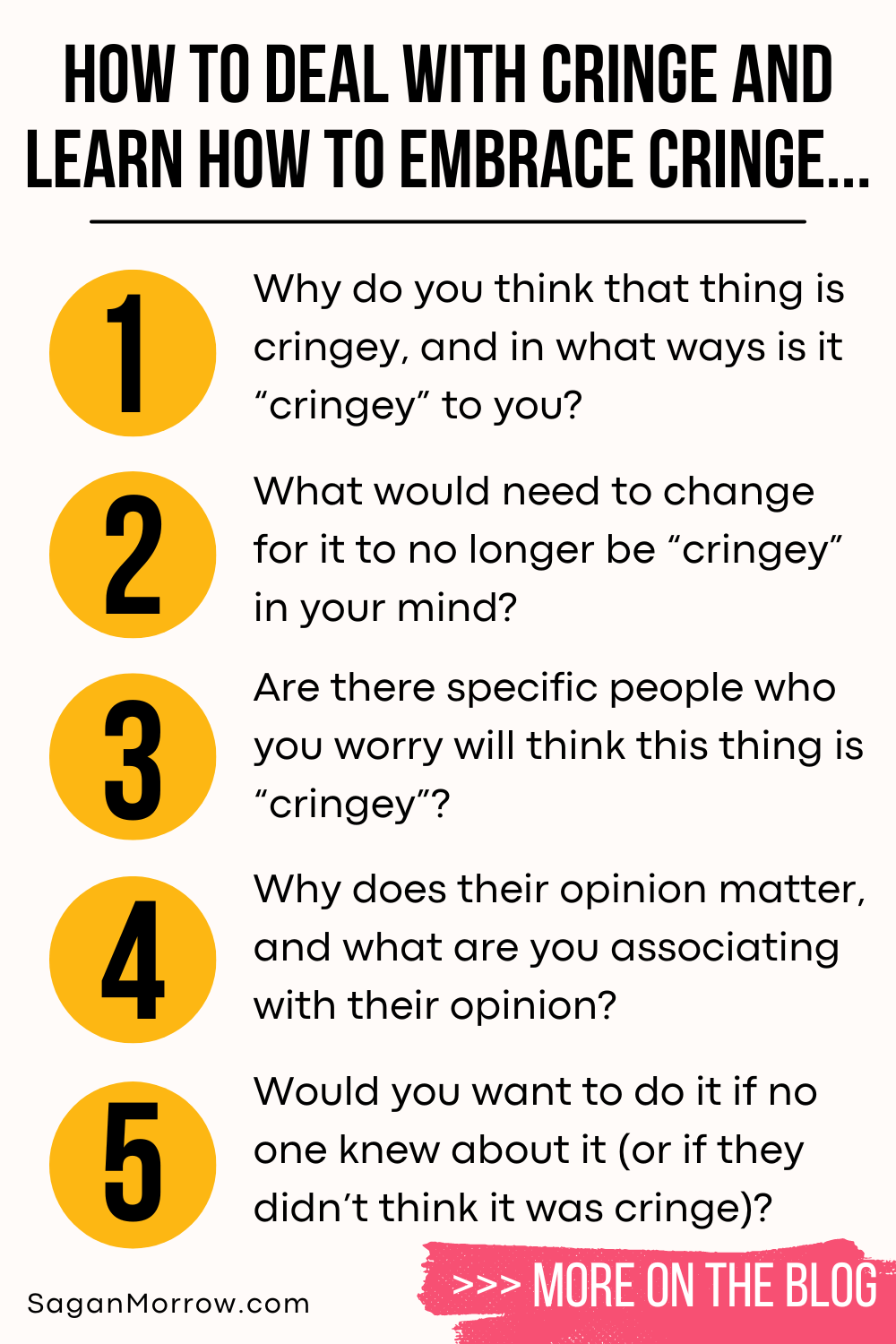Following up on our previous blog post, where we explored what it *really* means when you dislike the sound of your own voice or seeing yourself on video… Today, let’s talk about CRINGE: how to cope with being cringe, why should you embrace (and event accept) "cringey" behaviour, and how to free yourself from the idea of cringe!
Topics we're address in this article...
- Why bother even trying to cope with being cringe?
- Dealing with cringe:
- 7 questions to explore if you think something is "cringey."
- 5 points to consider if you're worried other people will think you are "cringe."
- How to stop worrying about being cringe.
- The way proximity alters how "cringey" something is to you.
- Why — and how — to accept (and even embrace!) cringe.
- The way you are doing yourself a disservice by dismissing your behaviour as cringe.
Who am I to speak on this topic?
As a Life Coach for Solopreneurs, I specialize in helping you be your best self... which includes embracing who you ARE, at your essence.
I work with self-aware individuals (like you!) to develop your intrapersonal skills, increase personal fulfillment in your business and life, improve your relationship with yourself, and take action to live the type of life — and be the type of person — that you've dreamed about.
Why BOTHER coping with "being cringe"?
This is important because if you do NOT learn how to cope with being cringe, you are going to always get in the way of fulfilling your true potential.
Effectively dealing with cringe means you are paving the way to be your best self.
There’s a lot at stake here, so let’s dive in…
Often, people will find themselves looking back and cringing at your past self; at your old way of doing things:
I can’t look at that old video of myself — I’m so cringey!
I can’t believe I used to act that way/talk like that! That’s so embarrassing and cringe.
I would NEVER do something the way I used to. It’s too cringey.
You need to learn how to STOP cringing at your past self, and how to embrace your cringe…
Dealing with cringe
Dealing with cringe starts with identifying: “Do I think this thing is cringe, or do I believe others will think it’s cringe?
…Those are two different things!
If YOU think a thing is “cringey,” it’s worth exploring:
- Why do you think it’s cringey?
- In what ways is it “cringey” to you?
- What would need to change for it to no longer be “cringey” in your mind?
- Is it appealing to you even though it’s “cringe” (AKA do you still WANT to be doing it)?
- What makes a thing “cringey” to you?
- WHY, specifically, does a thing being "cringe" mean that you are not going to let yourself DO that thing, as a result?
- What, exactly, is so terrible about being “cringe”?
You won’t be able to effectively get over cringe behaviour unless you can answer those types of questions.
If you believe other people will think a thing is cringe, here are a few questions to ask yourself:
- Are there specific people who you are picturing that might think of something as cringe?
- Why does their opinion or thoughts matter to you?
- What are you associating with their opinion?
- If that person had no idea you were doing this thing, would you want to do it anyway?
- What would happen if those people did NOT think this thing was cringe?
There can be A LOT to process and unpack beneath the surface of even one of these questions — which is exactly why I'm here to help!
Book your coaching sessions HERE.
After you’ve defined what you mean by calling something “cringe,” and after you’ve differentiated between other people thinking something’s cringe vs YOU think it’s cringe, you’ll be better positioned to determine whether you want to work through those feelings of cringe or not (and THEN you can learn how to cope with being cringe!).

How to Stop Worrying about Being Cringe: On Being True to Yourself
An extremely important thing might happen, when you start to analyze your relationship to that thing you’re thinking of as “cringey”...
…You’ll start to recognize when you’re being true to yourself, compared to when you're NOT.
For example: If you’re worried that OTHER PEOPLE will believe something you’re doing is “cringey,” but it’s something you genuinely want to do — and the only reason you’re holding yourself back is out of fear of what they’ll think/say — then in that case, it indicates that doing the so-called cringey behaviour will actually be you being true to YOURSELF.
→ If something only feels “cringey” in the context of what other people will think, then they are trying to divert you from your own truth. They are pulling you away from what you intuitively deeply desire.
On the other hand: If YOU feel like something is “cringey” — and perhaps you’re only acting a certain way because you see other people acting in that way — then in that case, your “cringe radar” might be telling you something really important about *who you are* and who you want to be.
→ If something feels “off” or “cringey,” because it doesn’t feel like YOU, then you should listen to that. Don't do anything that truly feels "off" to you.
Once again, it’s important to listen to and strengthen your intuition — that’s what will help you to stop worrying about being cringe.
Learn how to tap more deeply into your intuition with the Activate Your Intuition masterclass:
(This will help you change your mindset AND your behaviour for personal development and self improvement!)
How to Cope with Being Cringe — the Proximity of Cringe
Here’s an interesting phenomenon I’ve noticed as an indie author:
The further I am from my books (in other words, the more time I spend AWAY from my books, and the longer it’s been since I’ve last read my manuscript), the “worse” I think they are.
…In my head, they’re more “cringey” than in actuality.
When I finally bring myself to read them (after a long time of not reading them), I typically have a *pleasantly surprised* reaction! They’re not “cringey” like I’ve built them up to be in my head.
This would then suggest that I need to stay more closely entwined with my books… I need to stop putting space between us.
This is one of the ways for how to cope with being cringe: Bring yourself in closer proximity to that thing that you believed was so cringey.

How Do You Accept Being Cringe, and WHY Should You Embrace Cringe?
Whether something is “cringey” is purely a state of mind, and it is typically related to unfounded fears of visibility or discomfort of leaving the comfort zone or the rush of “stepping outside the box” and doing something out of the norm.
It’s not that the thing itself is genuinely “cringe-worthy” — because there’s no such thing! It’s purely subjective.
…Instead, it’s that you’re putting yourself in a position of vulnerability (with yourself or with others or with societal expectations, etc).
When you choose (because yes, it’s a choice) to think of something as “cringe,” it’s essentially a way for you to reconnect with the norms and the expectations: To return to safety or your comfort zone.
It’s a protection measure: You are telling the world, “Haha, I know that this thing I’m doing is cringey, so because I’m laughing at it, you can’t laugh at me. We’re laughing at me together. I’m part of the joke. I’m in on the joke.”
This then means that you should embrace “being cringey,” in the sense of other people thinking a thing is cringey:
As long as it feels true to YOU, and you follow through on that thing, it means that you are living your life for yourself. It means that you are expanding your comfort zone and stretching yourself and putting yourself out there.
How do you accept being cringe? You do this by learning how to accept YOURSELF.
THAT is how to cope with being cringe!
When you cringe at something that you are doing, you are cringing at yourself.
Learn how to accept all parts of yourself and you’ll no longer have to worry about “being cringey.”
Get help with accepting & embracing those deep innermost parts of yourself that make you, YOU:
The Disservice of Viewing Yourself as Cringe: How to Free Yourself From Cringe
Looking at past accomplishments as “cringe” (e.g. your first public speaking engagement, the first novel you wrote, etc) TAKES AWAY from your Past Self.
It’s not fair to all the work you put in and the huge amount of bravery and courage it takes to do that.
It also detracts from the experience of your teachers, your peers, and the audience who cheered you on back then. It’s kinda dismissive of them! It’s not fair to those people who LIKED your old way of doing things, and who have supported you this entire time.
(We talked more about this in our previous blog post about how to get over hating the sound of your own voice)
In a few years, you might look back at your current accomplishments and think, “That’s so cringey.” But you are putting in tons of effort and doing AWESOME for where you’re at, right now.
Instead, reframe it: “I am so proud of myself for what I did at THAT stage of my career.”
There’s a gratitude, celebration of courage, acknowledgement of progress, inherent in all of this.
You free yourself from cringe when you reconcile not only the different parts within you, but also all versions of yourself: Past, Present, and Future.
Want to learn more about how to do this mindset work for personal growth and self improvement?
Attend my FREE on-demand masterclass, Intuition Activated:

